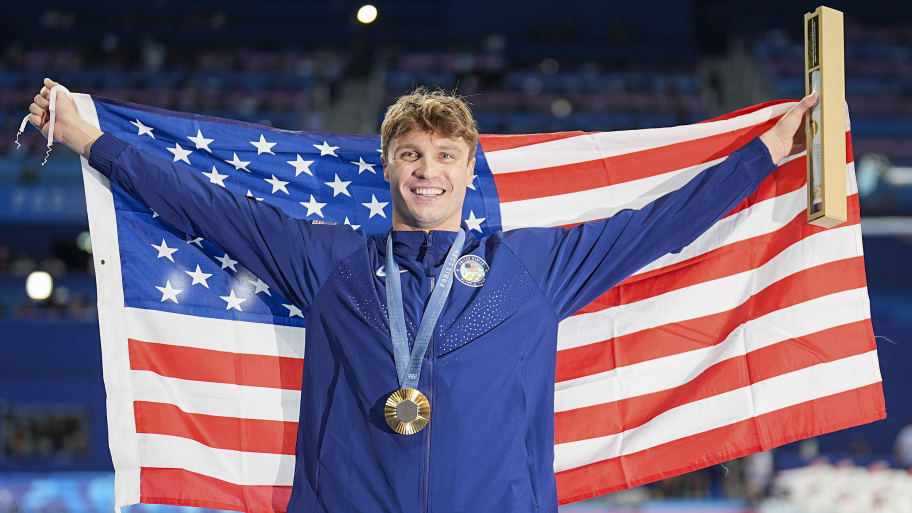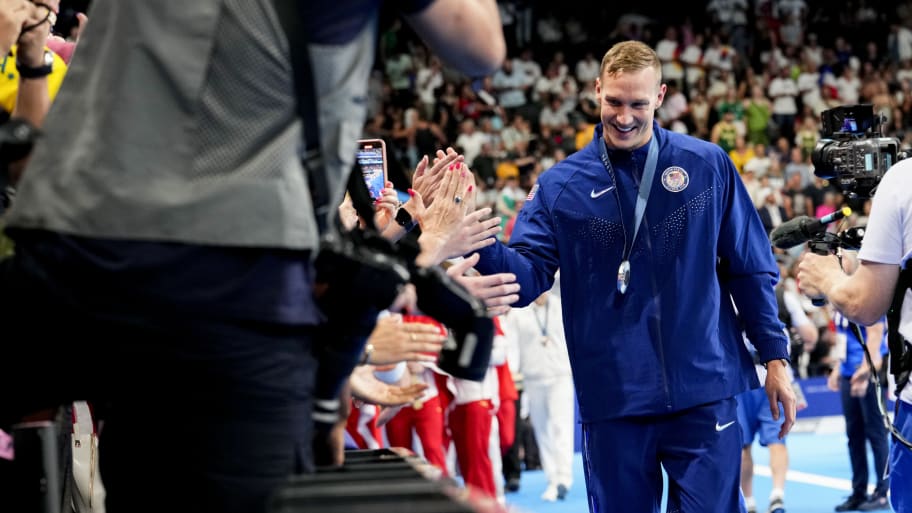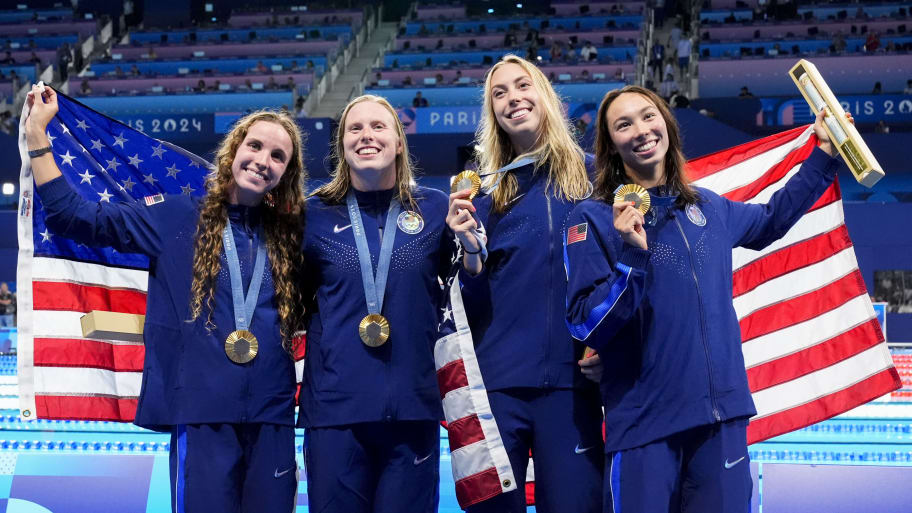
PARIS — There has been plenty of talk about the waves created by the shallower-than-normal Olympic pool. But on the final night of the swimming competition here, the pool created something different—emotional whiplash for the Americans.
Bobby Finke’s all-guts world record in the 1,500-meter freestyle was a massively clutch swim that kept alive the U.S. streak of at least one individual men’s gold medal in the pool since 1900. It was followed by a sobering, first-time-in-Olympic-history loss for the U.S. men’s medley relay, with the dethroning delivered by a Chinese team dogged by doping controversies. And then that gave way to a powerful, walk-off world record by the American women’s medley relay.
Fin, as they say in French.
Now the reckoning begins.
The final day was an appropriate mixed bag of results for a wildly uneven, largely disappointing U.S. performance. USA Swimming can point to winning both the gold medal and overall medal tallies, with eight golds and 28 total medals to Australia’s seven golds and 18 total medals. After losing the gold-medal tally 13-7 to the Aussies at World Championships last year, that’s at least one embarrassment reversed. Barely.
But here’s the bigger picture: eight golds is the fewest by the Americans in the pool since 1988, and the 28 total is the fewest since 2004. And keep in mind, three events and nine medal chances have been added since 2020.
Nobody expected this to be an easy swimming Olympics for the country that has historically dominated. But hopes were raised after a fast performance at U.S. Olympic trials in June in Indianapolis, and then the Americans failed to follow through in France.
Times are difficult to compare from Indy to now because of the La Défense Arena pool, which produced a lot of slow performances and some erratic results. Place matters more than time at the Olympics anyway, and in general the U.S. did not swim up to its seeding.
Across 35 events, American swimmers finished a combined 89 places lower than their seeding on the pre-meet entry list—an average drop of 2.5 spots. The women fared considerably better than the men in that regard, while also winning five golds to the men’s two (one was shared in the mixed medley relay).
A few extreme busts skew the seeding number slightly, when other metrics make the overall performance look slightly less drastic. For instance, five times Americans were seeded to win medals and missed the podium, while three Americans took home hardware who were not expected to, according to seeding.
Still, the overall picture of underperformance is pretty clear, and the sky-high U.S. standards don’t allow for much in the way of underperforming. Swimming might only be second to basketball in terms of the public demand to dominate at the Olympics.
American male headliner Caeleb Dressel, who bounced back from a two-event debacle Friday to swim a very good butterfly leg on the medley relay, spoke two truths that are in conflict with each other: the standards aren’t changing in the U.S. and the world is catching up.
“It wasn’t a bad meet at all,” said Dressel, who has won nine Olympic medals, eight of them gold. “The goal when you come to the Olympics and World Championships is gold medals. There’s other countries that are getting very dominant. The wealth has just been spread around. I don’t think we’re getting any worse, per se.
“I don’t think the goals need to change because the world is getting faster. I don’t think we start striving for silver and bronze—not that there’s anything wrong with that, but we want to be the most dominant team. And we were at these Games.”
The margins were just smaller. And truth be told, the U.S. went into the weekend needing to swim very well to salvage anything positive from this meet.
That largely happened. On Saturday Katie Ledecky did what she does, winning the 800 freestyle, and then the mixed medley relay came through. And on Sunday, Finke and the women’s relay sandwiched some heroics around another otherworldly Chinese performance.
Leading up to his race, Finke was well aware of America’s no-gold individual performance by the men. Not one to shy away from what many athletes would call “outside noise” he said he actually dove into the comments section on the niche website Swimswam.com.
“I like reading that stuff,” Finke said. “It kind of motivates me inside.”
That said, Finke also acknowledged feeling pressure. After winning both the 800 and 1,500 in Tokyo three years ago, he couldn’t quite rally to catch Ireland’s Daniel Wiffen in the shorter of the two races earlier in the week. So he got on the blocks for the 1,500 and just went for it.
That’s a scary strategy in the longest pool race, one that can come at a heavy cost. And it runs counter to Finke’s trademark, late-charging style. But with everything on the line he just tossed aside caution and attacked from the very first stroke.
“That really was not my strategy going into the race,” he acknowledged with a laugh. “I didn’t know how the race was going to play out. I kind of saw I had a pretty decent lead at the 300 so I knew I had to keep going and make the guys hurt a little bit. They started to catch up to me and I was getting a little worried, so I knew I had to keep pushing.”
Wiffen and, more pertinently, Italy’s Gregorio Paltrinieri, were the ones trying to catch Finke. While his lead was getting smaller, his pace ahead of world-record time was getting larger. The crowd got behind Finke’s record pursuit in the latter stages.
But Finke was only concerned with finishing first, trying to complete the transformation from a dead closer to a front-runner.
“I can’t let go of this now,” he thought to himself. “I can’t be the guy who got run down after I do all the running down.”
He ran away instead, scoring the last 50 in trademark Finke fashion to break the 12-year-old world record of China’s Sun Yang. In the whack-a-mole game of China and drug testing, removing the controversial Sun from the record books—he’s served a drug suspension and been involved in testing brouhahas—was followed minutes later by that country winning the men’s medley.
The race played out as a taut drama between the Chinese, Americans and French, to the roaring delight of the fans.
The Americans went with the quartet of Ryan Murphy, Nic Fink, Caeleb Dressel and Hunter Armstrong and it almost paid off. Murphy and Fink had good opening splits, but not quite as fast as they were Saturday on the front end of the mixed medley—they were a combined 1.04 seconds slower, which loomed large in a race decided by .55 seconds.

Dressel had a monster fly leg, clocking a 49.41, but that didn’t provide quite enough cushion for Armstrong going up against China’s Pan Zhanle, who smashed his own world record in the 100 free earlier in the meet in an eyebrow-raising 46.40 seconds. Pan followed that up with what might be the fastest relay split in human history, dropping a 45.92 to win the race—that’s .14 faster than Jason Lezak’s immortal 100 free split for the U.S. in the 2008 Olympics that kept Michael Phelps’ drive for eight gold medals alive.
Given China’s drug history, this was not an overwhelmingly popular result. Twenty-three swimmers had positive tests for Trimetazidine in 2021, which was revealed in the spring, and there have been revelations about other positive tests that were kept secret and yielded no penalties. Eleven Chinese swimmers at the Olympics were among those who tested positive in ’21, and two of those 11 were on the winning relay.
Pan, it should be noted, was not one of them. But his times have been a source of great discussion. Without sounding at all accusatory, Dressel said Pan’s 100 freestyle world record swim here was one of two in modern times that made his “jaw drop,” with the other being Adam Peaty’s 100 breastroke world record in 2020.
The question was asked of the American relay about losing to China, and Fink stepped in to answer it for Dressel. He answered about shortcomings by the World Anti-Doping Agency (WADA) in general, not China.
“It’s questions about the system,” Fink said. “Is WADA doing everything it can? We want more clarity and transparency on all this stuff. Nothing against the athletes competing, it’s just questions about the system. It seems like there’s cycle after cycle of concerns and questions.”

Following that race, the American women finished an overall positive meet with a thunderclap of a relay. Backstroker Regan Smith, breastroker Lilly King, butterflyer Gretchen Walsh and freestyler Torri Huske made sure it wasn’t close, with King breaking it open and the lead growing from there.
It was a nice valedictory moment for King, who is in the last of her three Olympics. The other three figure to be mainstays of the American team through 2028.
The present and future on the women’s side is bright. The men’s side should improve after being caught in a bit of a generation gap in 2024—there is a youth movement coming, some of which got valuable Olympic experience here.
“Those guys are kind of getting a taste for it now, they’re going to be in the hunt for gold, for sure,” Fink said. “We’re excited for them.”
For now, though, USA Swimming exits Paris with a mixed bag of results that didn’t live up to the traditional standard. There will be changes ahead, because a mixed bag won’t cut it at a home Olympics in 2028.
This article was originally published on www.si.com as Bobby Finke Saves a Century-Old Streak to Close Out Swimming at Paris Olympics.







